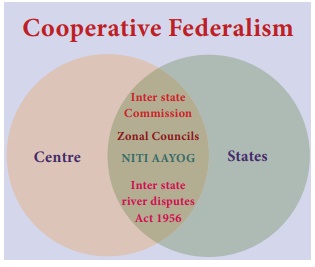Constitutional Provisions and Institutions | Federalism in India | Political Science - Co-operative Federalism | 12th Political Science : Chapter 5 : Federalism in India
Chapter: 12th Political Science : Chapter 5 : Federalism in India
Co-operative Federalism
Co-operative Federalism
The Indian Constitutional expert Granville Austin
described (Granville Austin, renowned scholar of the Indian Constitution,
described) Indian federal system as Co-operative Federalism designed to promote
co- operation between the Centre and States. The concepts of co-operative
federalism applies to those federal governments like the USA where the States
have more or adequate powers and the formation of the union is based on “the
indestructible union composed of indestructible States”. In a quasi federal
State like India, the Union Government can very easily pull down any
constituent State for non-cooperation or non-compliance or defiance of Union
Government’s will through Constitutional provisions, especially through the
emergency powers assigned to the President. The Constitution does not permit
States defiance to Centre.
There are many provisions, institutions and bodies
created in Indian political system to promote the co-operative functioning of
the central and State Governments in India. They can be classified into Constitutional,
statutory and political bodies and provisions.
Constitutional Provisions and Institutions
The Constitution itself has created a number of devices
to promote cooperation and co-ordination.
I) Inter-State Council
The article 263 of the Constitution says that the
President of India can establish the Inter-State Council to serve public
interests. There are three functions and duties assigned to the Inter-State
Council
a) TO enquire into and advise upon disputes among
the States
b) TO investigate and discuss the subjects that are
common to the union and State Governments
c) TO make recommendations to the President for
better co-ordination on any particular subjects among the State Governments.
A number of councils have been created to promote
cooperation on specific subjects in the past like the Central Council of
Health, Transport Development Council, and Central Council of Local Self-
Government.
The holistic Inter-State Council was established in
early nineties to deal with general cooperation among the units of Indian
federal system on the recommendation of the Sarkaria Commission. The Prime
Minister functions as the chairperson of the council. The Chief Ministers of
all the States and Union Territories with Legislative Assemblies, six cabinet
ministers of the Union Government, administrators of the Union Territories
without Legislative Assemblies and Governors of States under President’s Rule are
its members. A Standing Committee consisting of the Union Home Minister, five
other Cabinet Ministers and nine Chief Ministers also works as part of the
Inter State Council to promote co-operation among the members of the federal
system.
II) Statutory Bodies
There are certain bodies created through the
statute of the parliament but not mentioned in the Constitution that function to
promote cooperative federalism.
1. Zonal Councils
The Zonal Councils were established by the States
Reorganization Act in 1956 to achieve cooperation and co-ordination among
States. They were created in the backdrop of linguistic reorganization of India
and the first Prime Minister of India Jawaharlal Nehru described their
objective as to “develop the habit of co-operative working”.

Originally five Zonal Councils were created and
later on in 1971 one more Zonal Council was established for the North Eastern
States. They are
1. Northern Zonal Council
2. Southern Zonal Council
3. Eastern Zonal Council
4. Western Zonal Council
5. Central Zonal Council
6. North Eastern Zonal Council
The Union Home Minister will be the common
Chairperson of all the Zonal Councils. Additionally, each Zonal Council will
consist of the Chief Minister and two other Ministers of the each State and the
Administrator of the Union Territory in the zone.
The Zonal Councils will discuss and suggest
measures to promote cooperation among the members in areas like economic and
social planning, border disputes, inert-State transport etc.
2. River Board
The River Boards Act, 1956 establishes River Boards
to provide advice to the concerned governments concerned for the regulation of
an inter-State river or river valley.
3. Water disputes Tribunal
The Inter-State Water Disputes Act, 1956 was
enacted in accordance with the article 262 of the Constitution that mandated
that all inter-State river disputes should be resolved through negotiations.
The act provides for the formation of ad hoc tribunals for resolving
inter-State water disputes if repeated negotiations prove to be futile in
resolving the issue.
Political or Resolution Bodies
NITI AAYOG
The Union Government created the National
Commission for Transforming India after dissolving, 65 year old, the Planning
Commission on January 2015. The Prime Minister is the ex officio chairman and
the permanent members of the governing council are all the Chief Ministers of
all the States, Chief Ministers of the Union Territories of Delhi and
Puducherry and the Lieutenant Governor of Andaman and Nicobar Islands. One of
the primary objectives of the commission is to “foster cooperative federalism
through structured support initiatives and mechanisms with the States on a
continuous basis”. It recognizes that strong States will make strong nation.
But, without Constitutionally empowering more the constituent States and
adequate devolution of revenue resources, the States continue to remain over
dependent on the Union Government, even in matters relating to tackling of
natural calamities.
Related Topics